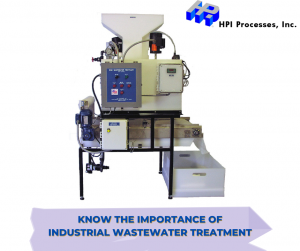Water is a crucial compound used across industries for various processes. Many times, it is released as a byproduct into local waterways. However, this byproduct contains various impurities in the form of chemicals, particles, and so on, some of which may be toxic. What this means is that the water cannot be released into the environment in its current state. It needs to be treated and its toxicity needs to be eliminated to avoid any catastrophic effects on the local wildlife and plant life. This is why industrial wastewater treatment is a crucial aspect. Currently, with stricter regulations regarding environmental norms and waste disposal, recycling of industrial waste has also gained importance. A system needs to be put in place in every manufacturing company that releases wastewater, to recycle and purify it so that is can be reused for basic purposes other than drinking. This post focuses the details of such industrial wastewater recycling systems.

Industrial Wastewater Recycling System and its Significance Discussed at Length
As mentioned, recycling of industrial wastewater is generally mandatory per the environmental regulations for local governments. The treated water can be used in various constructive ways such as for agriculture, gardening, in washrooms, power generation, and so on. Consequently, it needs to be free of contaminants and toxic elements. Additionally, with the growing demand and depleting sources of water, it needs to used carefully, this is where reused water helps. Even when released into the environment, the ground water level increases, and this also helps the local vegetation. Therefore, it is important that every manufacturer has their own wastewater treatment system to reduce the carbon footprint and avoid any devastating effects on the surrounding environment and humans. Here are some relevant points:
- A basic water treatment plant as described by the Environmental Protection Agency (EPA) comprises primary and secondary purification levels, while some systems may have advanced levels too.
- The primary level eliminates large particles, gravel, and mid to large-sized pollutants. The secondary level involves breaking down of pollutants and contaminants and treating them with chemicals such as chlorine.
- The advanced level further reduces contaminants, heavy metals, and chemicals present in the water.
- However, industrial wastewater needs a more thorough treatment to become totally safe for use and release in the environment. While coagulation and flocculation may seem like basic treatments, their use in treating industrial wastewater is significant. There are electrical as well as chemical coagulation systems. These systems facilitate a high flow rate which mean a few gallons of water can be processed in one batch. They can take up water mixed with corrosive chemicals, viscous solutions, and slurries.
- For heavily contaminated water, evaporators work well. These evaporation systems comprise a heavy duty tank, high efficiency burners, and drain ports. Most of these systems are capable of evaporating wastewater at around 10 gallons per hour.
- Bioremediation is another great option to treat wastewater. This process is very close to the natural process, and as the term implies, it uses bacteria or other such microorganism to reduce the contamination in water.
If you are an OEM with a manufacturing unit which releases wastewater, it is wise to invest in a good quality industrial wastewater recycling system. These systems purify the water and make it fit for reuse. However, ensure you source it from a reliable manufacturer with several years of experience and who can understand your requirements. HPI Pro is one of the leading manufacturers of next generation water recycling systems which are designed for industrial pressure washing applications. They help purify water, eliminate contamination, boost the efficiency of your manufacturing plant, and help keep the environment safe.
